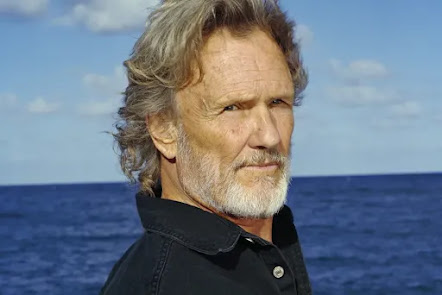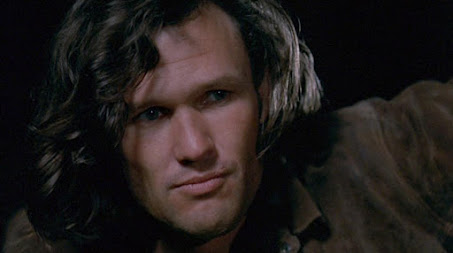Kris Kristofferson: A Farewell (And A Thank You)
Kris Kristofferson has left this plane of existence and I find the world without him to be a little bit dimmer, the sky a bit darker without his star shining as a guide for those lost at sea.
I don't remember when I first became aware of Kris Kristofferson. I've been fairly open about my sheltered, hyper-religious youth in which the majority of movies and music were kept away from me--I was told they were distractions from the straight and narrow of a holy, spiritual life. As such, it's quite likely that he wasn't on my radar at all until I started to get out from under their thumbs around the age of 16. What I do know with certainty is that Kristofferson's appearance in the first Blade film made quite an impression on me when it hit theaters; this grizzled, worn man with a craggy face, each line telling a story that I didn't yet know. He seemed out of place somehow in this polished comic book confection, too real for such escapist fantasy. Blade was The Daywalker, but Kristofferson seemed to know the night better than anyone.
This was also the time when I began to discover entertainment on my own terms. Because so much had been kept from me, I was a sponge, sucking up the films, albums, books, and television that had been placed out of reach for me in my younger years. At Blockbuster Video--which by then had put most of the mom and pop video stores out of business--I could rent five movies for $5 and keep them for 5 days. It was an incredible gift to a burgeoning cinephile, allowing cheap entrée into film history. Kristofferson was on a shelf in every section. There was Convoy on one aisle, A Star Is Born on another, Pat Garrett and Billy the Kid on yet another. At the same time, I was hitting thrift stores and flea markets to hunt for vinyl, which could be obtained for a mere 50 cents per record. Kristofferson was nearly as prolific in music as he was in film, and indeed, I soon learned that music was his first love and that he had penned some of the greatest songs ever written.
For a teenager connecting with the counterculture movement and making up for lost time, Kristofferson was a patron saint: a former soldier who spoke openly about his distaste for those who exploit the flag for profit, a rebel who railed against authority figures. Kristofferson struggled openly with his demons, but he also embraced them. The lyrics of "Sunday Morning Coming Down" speak unapologetically about beer for breakfast, smoking his mind the night before while playing guitar, and lighting another cigarette as our narrator looks at a sleeping world. I was attracted to the darkness, to the honesty, to the unvarnished vulnerability of his music. He wasn't a man without faith--indeed, he seemed to have great faith and humility. "Lord help me Jesus, I've wasted it, so help me Jesus, I know what I am."
Kristofferson seemed born to combat artificiality, pomposity, and the kind of finger-pointing and judgment that is so much a part of our lives. "Jesus was a Capricorn, he ate organic foods. He believed in love and peace and never wore no shoes. long hair, beard and sandals and a funky bunch of friends, reckon' they'd just nail Him up if He come down again. Cuz everybody's got to have somebody to look down on, prove they can be better than at any time they please. Someone doin' somethin' dirty decent folks can frown on. You can't find nobody else, then help yourself to me." There's humor in the song, but the chorus ends in a threat. "Help yourself to me." He growls the line, ready to fight anyone who wants to challenge him. That may have been the essence of Kristofferson: a man who valued peace, but also didn't shy away from violence. That duality runs through everything he ever did, both on film and on record.
You can't pigeonhole ol' Kris. Call him a leftist? Hardly. He loved Jesus, America, Hank Williams, and gospel. He just hated inauthenticity, pretentiousness, and anyone who thought they were better than anybody else. He was an outlaw before the term was fashionable, before it sold records, and long before it was co-opted by baseball-cap wearing pretty boys who were carefully-crafted products of the music industry. When he struggled with alcohol and drugs, he wrote about it in his songs. He talked about it in his interviews. He lived it, maybe--just maybe--even learned from it. His characters on screen weren't always heroes. Sometimes they were outright bastards, but even his rogues are rooted in understandable motivations. He loved women, he loved music, and he loved humble artists. Trying to put him in a box is pointless. He's bigger than the box.
I've known Kristofferson was battling dementia for a while now (as if one truly fights against the ravages of time, rather than simply enduring as long as possible). When one of the music labels set out to issue a new compilation of his music and wanted him to write a new introduction for the booklet, Kris needed to hear the music again because he'd forgotten it. Imagine that; a poet who has forgotten their own poetry. That's either a great tragedy or a great gift, I can't decide. Maybe it's both. Kristofferson made his final public appearance at Willie Nelson's 90th birthday party concert in 2023, and watching him duet with Rosanne Cash as they sang his classic "Loving Her Was Easier (Than Anything I'll Ever Do Again)" brought a tear to my eye. It wasn't just me; an appreciative audience leapt to their feet to give him a standing ovation, thanking him for what he's given us all. "We love you, Kris," someone yells. We sure do.
When I heard of Kristofferson's passing, I felt it like a physical blow. I was walking when someone told me, and it stopped me in my tracks. Knocked the air out of my lungs. It's not that it was a surprise (isn't it always a surprise?), but that I still wasn't ready. None of us will cheat death. Eternity is coming for every last one of us, but some losses hit harder than others. Even though I never met Kristofferson, he had a profound impact on me and my worldview. In a world of hucksters and liars, Kristofferson was true. When Johnny Cash died, Kristofferson said "Johnny was my hero long before I met him. He represented so much that appealed to me--like freedom. And I think the power of his performance came from the tension between this man who was deeply spiritual and also a real wild man. But to me, he doesn't represent danger, he represents integrity. And Jesus, that's just what we can't afford to lose today." Kris' words about Johnny might as well be my words about him.
Now all but one of the legendary Highwaymen stands side by side in the afterlife, waiting for Willie to join them. If one believes in Heaven--and I'm sure Kris did--the beauty of the hereafter is going to inspire an awful lot of new songs.








Comments
Post a Comment